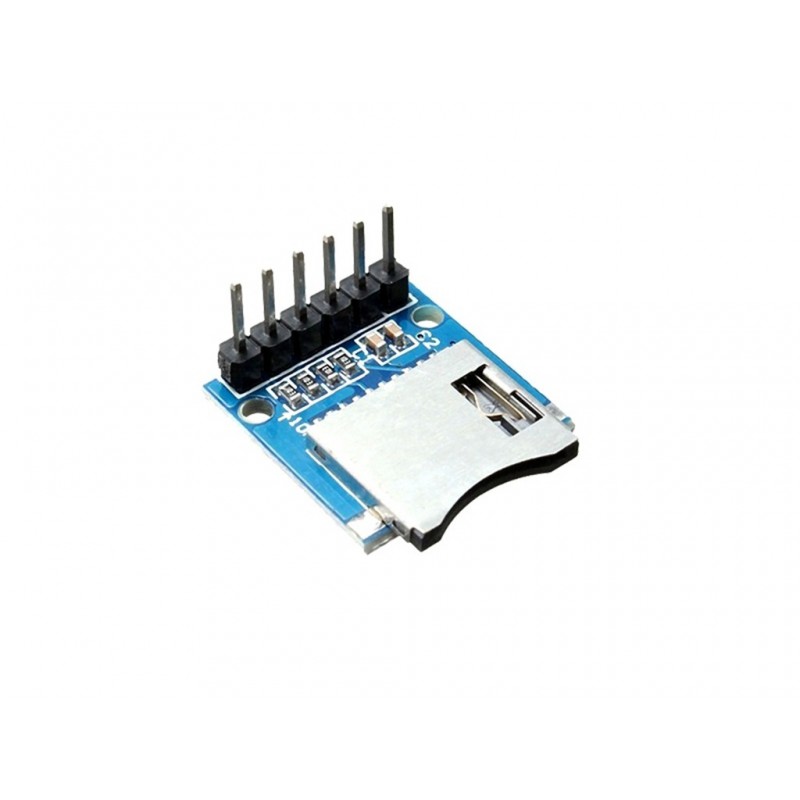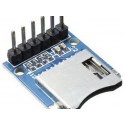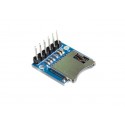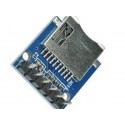Mini Micro Sd Card Reader Module
Rs. 21.00 Rs. 26.00
- Product Code: SEN-SD
- SKU -
- Availability: In Stock
- For Bulk Order
 9962060070
9962060070
Quick support on WhatsApp (+919962060070) only between morning 11am-4pm, no call will be answered
Add the desired memory to your project to store the data, Media etc. This Mini Micro SD Card Reader Module also called Micro SD Adaptor which is designed for dual I/O voltages.
The Module is a simple solution for transferring data to and from a standard SD card.
The pinout is directly compatible with Not only with Arduino but can also be used with other microcontrollers development boards.
Micro SD Card Reader Module has an SPI interface which is compatible with any sd card and it uses 3.3V power supply which is compatible with Arduino UNO/Mega.SD module has various applications such as data logger, audio, video, graphics.
There are total of six pins (GND, VCC, MISO, MOSI, SCK, CS), GND to ground, VCC is the power supply, MISO, MOSI, SCK is the SPI bus, CS is the chip select signal pin; 3.3V regulator circuit: LDO regulator output 3.3V as level converter chip, Micro SD card supply.
With this Module, general AVR microcontroller system can read the signal
| SPECIFICATIONS | |
| Supply Voltage (V) | 3.3 |
| Control Interface | GND, VCC, MISO, MOSI, SCK, CS |
| Mounting Hole size | M2 |
OVERVIEW:
-Supports FAT file system SD carrier
-Supports playing of 4Bit ADCPM format files
-Recognize the voice files automatically
-Support microprocessor and key control
-Audio output: 16bitDAC and PWM
PACKAGE INCLUDES:
1 PCS x Mini Micro Sd Card Reader Module
/*SOURCE CODE FROM BELOW LINK
https://wiki.dfrobot.com/MicroSD_card_module_for_Arduino__SKU_DFR0229_
SD card test
This example shows how use the utility libraries on which the'
SD library is based in order to get info about your SD card.
Very useful for testing a card when you're not sure whether its working or not.
The circuit:
* SD card attached to SPI bus as follows:
** MOSI - pin 11 on Arduino Uno/Duemilanove/Diecimila
** MISO - pin 12 on Arduino Uno/Duemilanove/Diecimila
** CLK - pin 13 on Arduino Uno/Duemilanove/Diecimila
** CS - depends on your SD card shield or module.
Pin 4 used here for consistency with other Arduino examples
created 28 Mar 2011
by Limor Fried
modified 9 Apr 2012
by Tom Igoe
*/
// include the SD library:
#include <SD.h>
// set up variables using the SD utility library functions:
Sd2Card card;
SdVolume volume;
SdFile root;
// change this to match your SD shield or module;
// Arduino Ethernet shield: pin 4
// Adafruit SD shields and modules: pin 10
// Sparkfun SD shield: pin 8
const int chipSelect = 4;
void setup()
{
// Open serial communications and wait for port to open:
Serial.begin(9600);
while (!Serial) {
; // wait for serial port to connect. Needed for Leonardo only
}
Serial.print("\nInitializing SD card...");
// On the Ethernet Shield, CS is pin 4. It's set as an output by default.
// Note that even if it's not used as the CS pin, the hardware SS pin
// (10 on most Arduino boards, 53 on the Mega) must be left as an output
// or the SD library functions will not work.
pinMode(10, OUTPUT); // change this to 53 on a mega
// we'll use the initialization code from the utility libraries
// since we're just testing if the card is working!
if (!card.init(SPI_HALF_SPEED, chipSelect)) {
Serial.println("initialization failed. Things to check:");
Serial.println("* is a card is inserted?");
Serial.println("* Is your wiring correct?");
Serial.println("* did you change the chipSelect pin to match your shield or module?");
return;
} else {
Serial.println("Wiring is correct and a card is present.");
}
// print the type of card
Serial.print("\nCard type: ");
switch(card.type()) {
case SD_CARD_TYPE_SD1:
Serial.println("SD1");
break;
case SD_CARD_TYPE_SD2:
Serial.println("SD2");
break;
case SD_CARD_TYPE_SDHC:
Serial.println("SDHC");
break;
default:
Serial.println("Unknown");
}
// Now we will try to open the 'volume'/'partition' - it should be FAT16 or FAT32
if (!volume.init(card)) {
Serial.println("Could not find FAT16/FAT32 partition.\nMake sure you've formatted the card");
return;
}
// print the type and size of the first FAT-type volume
uint32_t volumesize;
Serial.print("\nVolume type is FAT");
Serial.println(volume.fatType(), DEC);
Serial.println();
volumesize = volume.blocksPerCluster(); // clusters are collections of blocks
volumesize *= volume.clusterCount(); // we'll have a lot of clusters
volumesize *= 512; // SD card blocks are always 512 bytes
Serial.print("Volume size (bytes): ");
Serial.println(volumesize);
Serial.print("Volume size (Kbytes): ");
volumesize /= 1024;
Serial.println(volumesize);
Serial.print("Volume size (Mbytes): ");
volumesize /= 1024;
Serial.println(volumesize);
Serial.println("\nFiles found on the card (name, date and size in bytes): ");
root.openRoot(volume);
// list all files in the card with date and size
root.ls(LS_R | LS_DATE | LS_SIZE);
}
void loop(void) {
}
15 days




